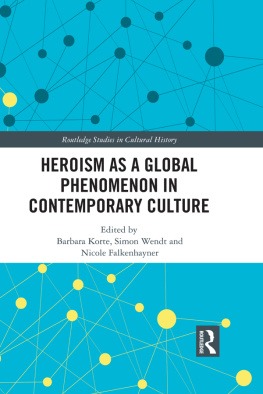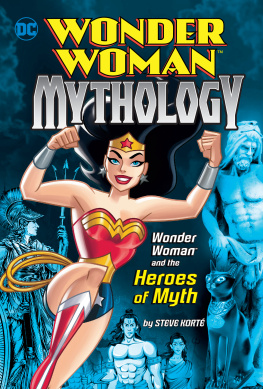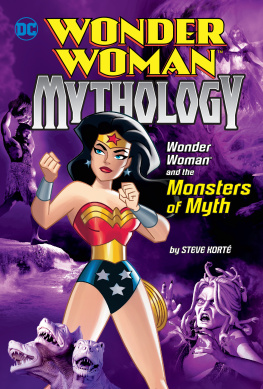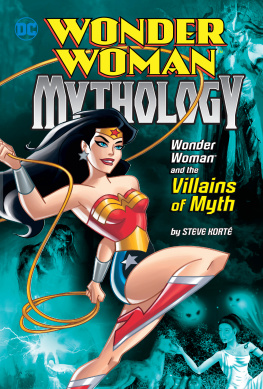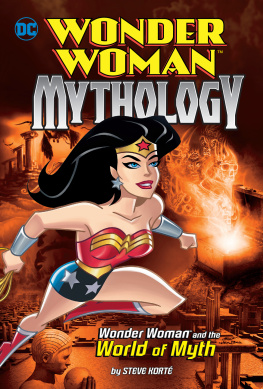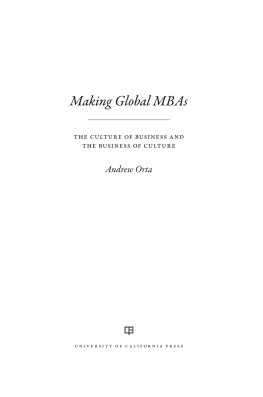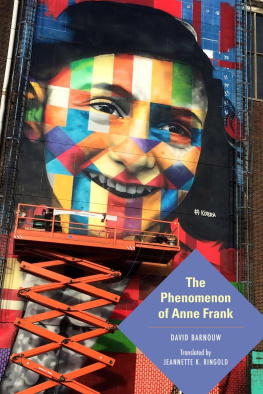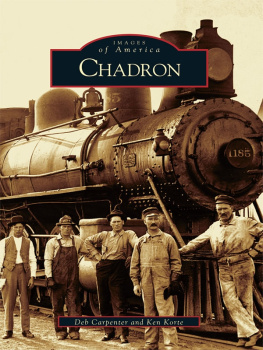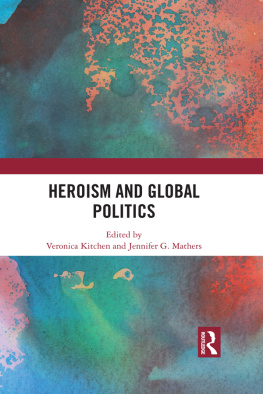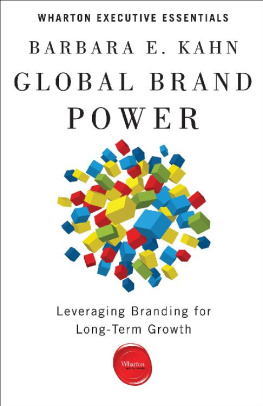Heroism as a Global Phenomenon in Contemporary Culture
Heroes and heroic discourse have gained new visibility in the twenty-first century. This is noted in recent research on the heroic, but it has been largely ignored that heroism is increasingly a global phenomenon in terms of both production and consumption. This edited collection aims to bridge this research void and brings together case studies by scholars from different parts of the world and diverse fields. They explore how transnational and transcultural processes of translation and adaptation shape notions of the heroic in non-Western and Western cultures alike. The book provides fresh perspectives on heroism studies and offers a new angle for global and postcolonial studies.
Barbara Korte is Professor of English Literature at the University of Freiburg and principal investigator at the Freiburg Collaborative Research Center on Heroes, Heroizations and Heroisms.
Simon Wendt is Professor of American Studies at the University of Frankfurt.
Nicole Falkenhayner is Senior Lecturer in British Literary and Cultural Studies and principal investigator at the Collaborative Research Center on Heroes, Heroizations and Heroisms at the University of Freiburg.
Routledge Studies in Cultural History
The Transatlantic Genealogy of American Anglo-Saxonism
Michael Modarelli
Anxieties of Belonging in Settler Colonialism
Australia, Race and Place
Lisa Slater
Families, Values, and the Transfer of Knowledge in Northern Societies, 15002000
Edited by Ulla Aatsinki, Johanna Annola, and Mervi Kaarninen
A History of Euphoria
The Perception and Misperception of Health and Well-Being
Christopher Milnes
The History of the Vespa
An Italian Miracle
Andrea Rapini
Children and Globalization
Multidisciplinary Perspectives
Edited by Hoda Mahmoudi and Steven Mintz
A History of Shaolin
Buddhism, Kung Fu and Identity
Lu Zhouxiang
Heroism as a Global Phenomenon in Contemporary Culture
Edited by Barbara Korte, Simon Wendt and Nicole Falkenhayner
For more information about this series, please visit: www.routledge.com/Routledge-Studies-in-Cultural-History/book-series/SE0367
First published 2019
by Routledge
52 Vanderbilt Avenue, New York, NY 10017
and by Routledge
2 Park Square, Milton Park, Abingdon, Oxon, OX14 4RN
Routledge is an imprint of the Taylor & Francis Group, an informa business
2019 Taylor & Francis
The right of Barbara Korte, Simon Wendt and Nicole Falkenhayner to be identified as the authors of the editorial material, and of the authors for their individual chapters, has been asserted in accordance with sections 77 and 78 of the Copyright, Designs and Patents Act 1988.
All rights reserved. No part of this book may be reprinted or reproduced or utilised in any form or by any electronic, mechanical, or other means, now known or hereafter invented, including photocopying and recording, or in any information storage or retrieval system, without permission in writing from the publishers.
Trademark notice: Product or corporate names may be trademarks or registered trademarks, and are used only for identification and explanation without intent to infringe.
Library of Congress Cataloging-in-Publication Data
A catalog record for this title has been requested
ISBN: 978-0-367-20665-9 (hbk)
ISBN: 978-0-429-26278-4 (ebk)
Typeset in Sabon
by Apex CoVantage, LLC
Contents
BARBARA KORTE AND SIMON WENDT
MICHAEL GOODRUM
KONSTANZE NGUESSAN AND MAREIKE SPTH
SOTIRIOS MOUZAKIS
NICOLE FALKENHAYNER AND MARIA-XENIA HARDT
DIETMAR NEUTATZ
MICHAEL BUTTER
WOLFGANG HOCHBRUCK
SUGATA NANDI
ARIEL HERYANTO
RICARDO K. S. MAK
ULRIKE ZIMMERMANN
KEN CHITWOOD
Guide
We are indebted to the Collaborative Research Center on Heroes, Heroizations, and Heroisms (SFB 948) at the University of Freiburg, for creating a stimulating environment for scholarly debate, and for generous support during the production of this book. SFB 948 is funded by the German Research Foundation (DFG).
Barbara Korte and Simon Wendt
The Currency of the Heroic in Globalized (Popular) Culture
The year 2018 saw the release of a Hollywood superhero blockbuster film that aroused far more attention by critics worldwide than other products from the Marvel industry. Black Panther , with its black director (Ryan Coogler) and predominantly black cast (with actors from not only the United States and the United Kingdom but also African countries), was widely noted as a timely comment on race relations in the United States, befitting the origin of its titular character at the time of the 1960s civil rights movement. But Black Panther goes far beyond the situation in the United States. By representing strong, regal, intelligent African men and women as warriors, scientists, and queens, it makes an intervention, via popular entertainment cinema, into issues of global significance that revolve around notions of the heroic.
The film shows how Prince TChalla, aka the Black Panther, whose superpowers derive from the metal vibranium, which is unique to his native country, returns home to become the new king. Vibranium has enabled Wakanda to escape the African historical traumata of slavery and colonization, and to develop into a wealthy country as well as the most technologically advanced civilization on earth. However, while defying all stereotypes about the dark continent with a unique blend of futurism and tradition, Wakanda has hidden its wealth and power from the world and refrained from entering global relations of all kinds, thus also missing a chance to correct generalized perceptions of Africa as a third-world poorhouse or, as the American president pronounced with characteristic frankness shortly before the film was released, a collection of shithole countries.
This short sketch of Black Panther must suffice to indicate how prominently the film raises very different issues of global import: the CIA as an American instrument for manipulating world politics, the role of the United Nations (where two scenes of the film are set), international arms dealing, and globally operating aid organizationsa trope which the film ironically inverts at the end when Wakanda promises to provide aid for the world, including underprivileged areas in the United States. This global dimension is supported by the films settings in America, Europe, Africa, and Asia (South Korea) as well as its portrayal of Wakandan futuristic weapons technology that can operate all over the world because it is virtual. At the same time, the film provides an explicitly Afrocentric and Afro-futuristic perspective on black heroism, using globalized imaginations of non-white peoples resistance to colonial domination to project a story of black pride that reverberates deeply in both African American and African communities.
Black Panther leads us right into the middle of the two topical cultural phenomenathe global and the heroicwith whose multiple entanglements the present book is concerned. The visibility of the superhero genre is only one sign of the new currency that heroic figures and heroic discourse have gained in the twenty-first centuryan era that many see as informed by widespread insecurity. While this currency is noted in new research on the heroic, it has been largely ignored that heroism is increasingly manifesting itself as a global, multicentred, transnational, and transcultural phenomenon, particularly in popular media culture, and that heroism may thus be considered a travelling concept in quite a literal, spatio-cultural sense.

